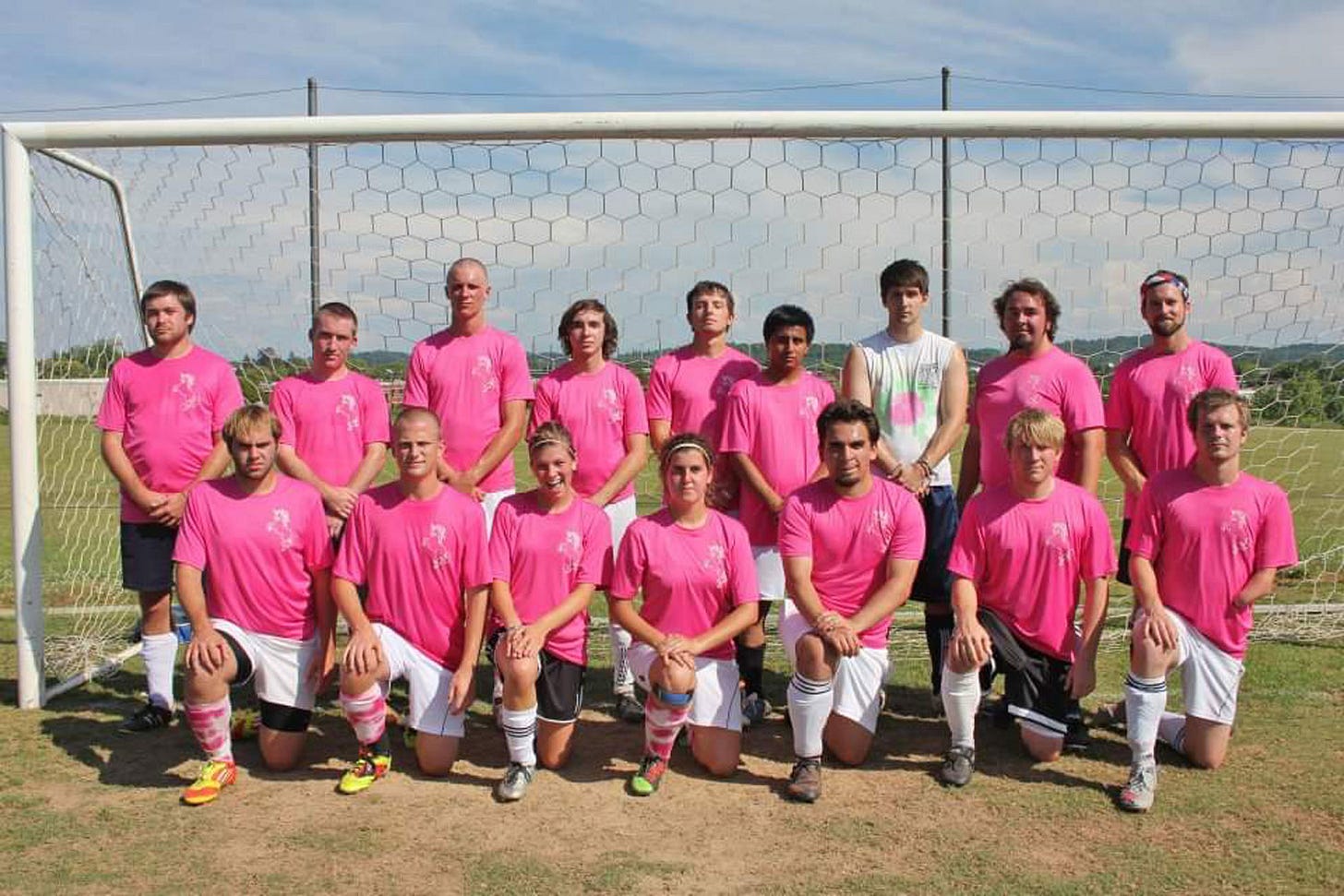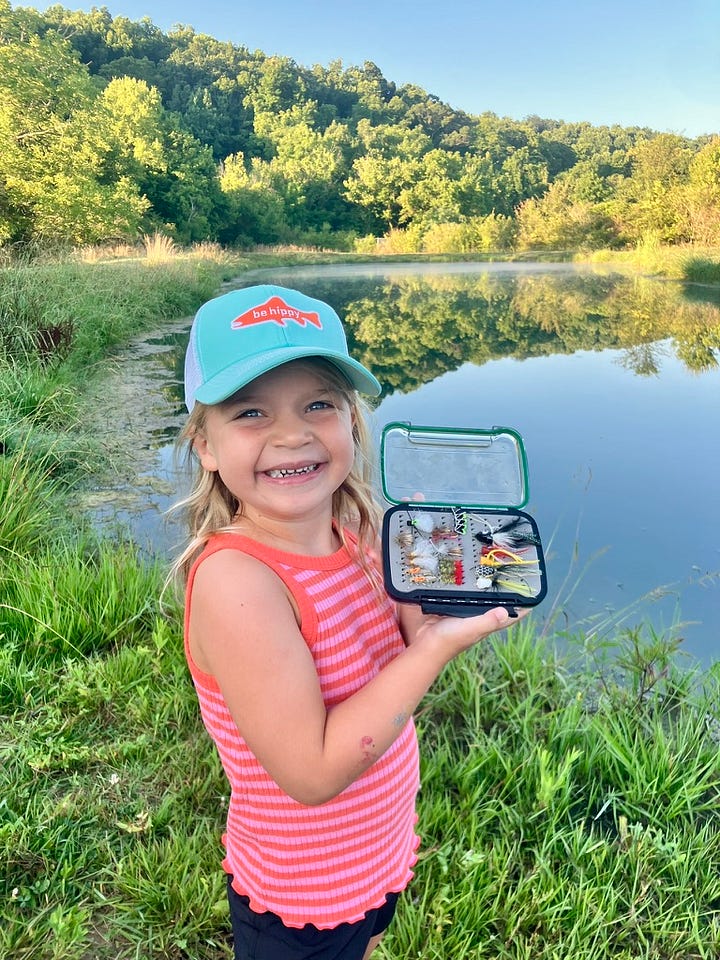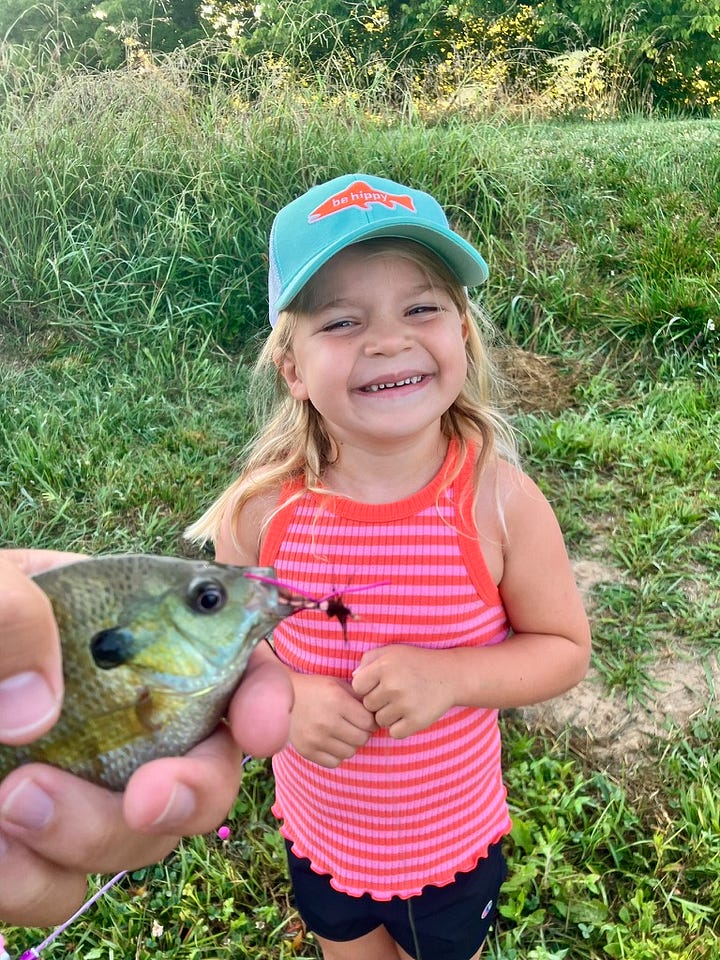Playing as Grown-Ups
On adult get-togethers, fun, energy vampires, and participation trophies.

Some day you will be old enough to start reading fairy tales again.
—C.S. Lewis, dedication to his goddaughter Lucy in The Lion, The Witch, and The Wardrobe
“So, what do you play at Mr. Jonathan’s house?” Alba asked me last Monday as I prepared to head out the door.
“What do you mean?” I asked.
When she has girl friends over, they play dress-up or make crafts. Enzo and his boys play construction or throw monster trucks at each other. “What do grown-ups do?” she repeated.
That night, my buddy and I planned to organize fishing flies and drink scotch. But I’d never thought of that or anything else, besides the occasional board game night, as more than hanging out1.
“Grown-ups don’t really play like kids do,” I explained to Alba, who looked at me perplexed.
Kids’ lives are steeped in the language of play, but I rarely consider my own experiences the same way. For years, I played trivia with the nerdiest dudes I know at Central Flats & Taps under the moniker Skillz that Killz2. After I was re-introduced to trout fishing, the Apocalyptic Cowboy, Fish Whisperer, and I would get together weekly with two other dudes to tie our best fly patterns. As recently as two years ago, I captained a Sunday League soccer team and had a squadron of Dads who came to the backyard on weeknights to drink whiskey, smoke tobacco, and talk religion beside a fire.
Even when we grown-ups use the term play as the verb before whatever activity we’re taking part in—playing golf or cards, for example—I’m not sure that we understand it the same way my daughter does. Being an adult is serious business. Everything must be pored over and strategized. And when we lose at something, we tend to walk away with a hurt butt.
Two years ago, I reflected on the wonder of unstructured playtime after spending an afternoon with Haley and the kids at Adair Park. In Finland, home of the best education system in the world, play is held in such high regard that kids don’t even start school until they’re 7. Even then, until high school, they take breaks every hour to run around outside.
Time continues to run away from me.
I can’t help but see it as currency I’m failing to draw a return on. Perhaps that’s why describing what I do when I can turn away from the computer screen or keep my eyes open long enough to be with friends as play seems childish. Only during the first decade-and-a-half of our lives can we afford not to think about expiration dates and ticking clocks.
As a boy, I yearned so badly to be a grown-up, with money in my pocket and the ability to do things without asking my parents’ permission, that I didn’t realize the freedom I was giving in exchange. Because who looks happier: the dude in a yacht, surrounded by supermodels, Elon Musk, with his free-wielding power and billions of bucks, or your kid when they slide down the Big Slide for the first time?
The glee in my kids’ voices when they invent new games like “Jumpy Jump,” in which they pile pillows and stuffed animals onto the living room floor to dive onto from the couch, is worth its weight in gold. When they throw imaginary spiderwebs or roar at each other like lions, I double over from the pain of laughter.
I rarely experience joy this pure.
The happiest I’ve been, outside of my time spent with my family, in the past year was last June when I caught the biggest brown trout of my life on the South Holston River.


“Can you come upstairs to play later?” Alba asks when I ascend from the office for lunch or to grab a glass of water on my work-from-home days.
And even though I say yes, of course, half of me feels flustered that my income generation should be interrupted for something that cannot be measured to show improved performance. Immediately, the other half is furious that I can’t find joy in swinging my kid from their feet for 10 minutes because I feel the need to hustle back to answer emails.
Hernán Casciari describes writing as play.
In the workshops I’ve taken with him, he has urged us not to “make literature” but to have fun telling stories3. And he’s also said that if we’re looking for a First Reader, the best kind is a kid because they can’t help but tell you when you’ve lost their attention. The story I translated last week, co-written by Jorge Luis Borges and Adolfo Bioy Casares and published under a pseudonym, was introduced by Casciari, when he covered it for Argentine television in 2019, as “one written by the two friends when they got together to hinchar las pelotas.”4
Lately, I’ve taken to describing what I do when I write as scribbling. I tell my students the same when they worry a first draft isn’t good enough. “If it stops being fun, do something else,” I say. Last night, during a time of group prayer with friends, a doctor friend told me that he’d tried writing a story once after listening to J.K. Rowling describe the moment, as a child, she realized that she was born to be a writer. But after 20 pages, he thought the story was no good and tossed it. What the world might’ve missed out on!
Between hanging out at Jonathan’s and praying with the doctor, a former student came by the porch to toss around ideas about forming a storytelling collective.
We first approached it like I did my Bear Den events in 2022 and 2023: a public gathering for people to attend that requires all the logistics of preparation that make adulthood boring. But a few glasses of dark liquor brought clarity, and we ended up with the outline for an informal, organic community where storytellers across mediums—song, fiction, comedy, improv—could hang out and amuse each other without stages or microphones. We’d be back around the campfire, like we were as kids, sharing ghost stories.5
The morning after I hung out at my buddy’s, Enzo was up before the crack of dawn building magnet-tile towers and asked, “Did you play trucks at Mr. Jonathan’s, Dad?”
“No, dude,” I said. “We played with little flies we made for fishing. We took them out, put them back in. And then we ate chicken nuggets and made up stories we pretended were true about the biggest fish we ever caught.”
“Want to build with me?” he asked with a smile.
“Sure, dude,” I wish I’d said. But instead, I went downstairs to send an email.
Before you leave, support my work by upgrading to a paid subscription for as little as $4.17/month ($50/year), buying me a coffee, or ordering a copy of my first story collection, Big Head on the Block. You can also listen to my stories on YouTube and Spotify.
Words from the Wise
“The opposite of play isn’t work, it’s depression. The adult-play deficit is becoming a public health crisis.”
—Stuart Brown, social scientist and founder of the National Institute for Play
Useful Trivia
According to psychologist and game designer Dave Neale, there is a dividing line between how adults and children experience play. The latter partake in daily episodes of play, while adults favor playful interactions with each other, such as cracking jokes or trading memes. When grown-ups do engage in episodes of play, they tend to be structured and with more defined rule-sets, such as rec sports, video games, improv comedy, and escape rooms.
One of the more psychologically beneficial forms of play for adults is the Murder Mystery Game. Besides helping to develop emotional coping strategies and practicing reactions to real-life threats, they also reveal bias, as was the case in 2016 when University of London psychology professor Fiona Gabbart introduced three highly interactive games to the public. Despite criticizing real-world detectives for debunked techniques that rely on intuition over evidence, the participants devolved quickly and held firm even when they had little justification besides feeling. “The point we wanted to make is that a lot of people can very confidently hold an opinion and yet might be entirely wrong,” Gabbert said.
Read more:
“A Golden Age of Play for Adults,” The British Psychological Society, March 2020
“The Surprising Benefits of ‘Scary Play,’” BBC, April 2022
What I’ve Been Enjoying
A recent chapter I listened to in Thomas Foster’s How to Read Literature Like a Professor discussed the literal and metaphorical use of werewolves, vampires, and ghouls in popular fiction. Foster takes a moment to explain the concept of the energy vampire, which I was familiar with only because of Colin Robinson’s character in the TV version of What We Do in the Shadows. “One of the best ways to drain people’s energy nowadays is via the internet,” Robinson says in a scene in which he has several laptops set up to “feed” by trolling people on Facebook.
It took about three days for me to listen through Simon Rich’s latest collection of short stories, Glory Days, which was narrated by his friend John Mulaney, who he met while the two were writing for SNL. The stories in the book each deal with growing up, raising small children, and middle age. Among my favorites were “Mario,” in which the character offers a first-person narration of the challenges of turning 40, and “Participation Trophy,” written from the perspective of the trophy and which starts off as a joke but eventually becomes a smart (and better) reflection on what I wrote about to start this column.
The Spotify algorithm recently fed me the tune “Snakebite” by Georgia songwriter Brent Cobb. Like all the dude touches, it’s a good’n. The song’s story is one in the long line of personifications or pacts with the devil. The Prince of Darkness recently showed up at my front door. I rejected his offer, for now. But he said he’d be back with another before long. I’ll write that story for you soon.
Actually, hanging up is what my immigrant father has always called it. I have an entire lexicon of English phrases that make little sense, which I learned from him. “Check it up” for check it out and “sugar” for shiznit are other favorites.
Yes, this is taken from Dodgeball. And yes, it’s also the name of many of my championship-winning rec-league soccer teams since college.
I recently added a section to this Substack called The Casciari Project, where I’ll translate more of his work for fun.
This common Argentine phrase literally translates to “swell the balls,” and is the equivalent of busting chops or annoying people. The detective fiction of Honorio Bustos Domecq was not popular. And, even though he’s not alive to confirm it, I wonder if Borges pitched the idea over wine to Bioy one night because of how much he loved G.K. Chesterton’s Father Brown stories. The good pals also wrote under the pseudonym Benito Suárez Lynch.





Brent Cobb is from Ellaville, which isn't too far from where my wife is from. Not quite same region, but we pass it on our way there.